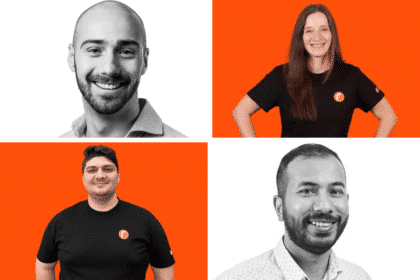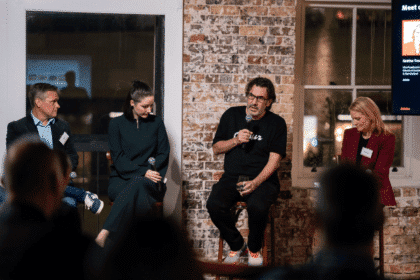Visual communications company Canva is well on its way to achieving its mission to empower everyone in the world to design. To date, Canva has over 80 million monthly average users across 190 countries and there’s no doubt that the skills and commitment of their highly motivated team play a huge role in the company’s success.
We spoke to Software Engineer Karolina Pawlikowska about her career and role at Canva. She shares why she thinks it’s so important to empower young women in the industry and how the Matrix movies helped inspire her career.
B&T: For you, why is it so important to support Women Leading Tech (WLT)?
KP: It’s important that young women can see role models they can identify with. Supporting technical women leaders not only directly affects the lives and careers of those leaders, but also provides visibility and inspiration for the next generation of women entering the workforce. It’s the ultimate win-win. At Canva, as one of the world’s fastest-growing tech companies, we recognise we’re in a unique position to support the tech community. We’ve learnt a lot from our journey as a small Aussie start-up to a successful company continuing to rapidly scale and we want to share those learnings back with the industry. We’re also passionate about helping ensure there is a new generation of young women talent entering the industry in the coming years.
B&T: The theme of this year’s WLT event is “Be the change you seek,” on this note what steps are you and your business taking to ensure greater inclusiveness and equality in the industry?
KP: When it comes to promoting gender diversity in tech there are usually two key areas of focus, attracting diverse talent and designing a safe and inclusive experience for employees from diverse backgrounds. I believe that the first one is much easier to achieve once the right culture, engagement methods and support networks are in place. For that reason I’ve been running a social group within Canva called Canva Women Engineers (CWE) for nearly 3 years now. CWE is a safe space for all women and gender diverse people to get together, share experiences, learnings and achievements. We help each other find solutions to both career and technical challenges as well as suggest changes and improvements to Canva’s existing processes. CWE has its own Slack channel, we meet monthly for virtual lunch and we regularly organise events for welcoming interns, IWD and other occasions.
Canva is committed to creating an inclusive environment and celebrating diversity in all its forms. We’re currently launching the 4th cohort of Unstoppable Me – a program directed at emerging technical female leaders designed to guide and empower them through their journey. Our team of internal coaches work with these engineers to help them understand how they see their career path, how to move through their blockers and achieve their individual success.
Canva is also involved in partnerships with external organisations like Girls of Impact to help develop the next generation of women in tech!
B&T: Can you tell us about your work history and current role and what some of the biggest challenges/obstacles you’ve faced are?
KP: I started programming as a kid after watching The Matrix. The character of Trinity – a strong female lead in a world run by machines – really inspired me to explore and harness the tech world! I started out creating websites and simple web apps (usually puzzles for my friends to solve) and spent my high school days freelancing as a designer and web developer until I discovered Android in 2011. A year later I enrolled to study Computer Science at the University of Warsaw and got my first long-term job as an Android engineer after another year.
My passion for Android eventually led me to landing two internships at Microsoft. One of the first challenges of my career was choosing between coming back as a full-time employee to Microsoft or giving this promising Aussie startup called Canva a shot… Eventually after analysing my options from every possible angle and refining my pros and cons lists I decided to take the risk! I saw more potential for growth and having an impact by working in a smaller company in a domain that I’m passionate about – design.
From there, I eventually worked my way into Canva’s newly established video team. After working as an Android engineer for a couple of years I realised that if I want to stay at Canva and take my career to the next level, which for me was team leadership and people management, I had to switch my speciality to web development. Switching back from my beloved Android to web wasn’t easy but I believe that it made me a better engineer and a better leader with cross-specialty understanding of the product.
B&T: What is your most-career defining moment? How has this changed you?
KP: It’s very difficult to find a single moment that defined my career! I feel like coming to Australia was one of them. Joining a new, technically challenging team like Canva Video is another. But I think the true change happened to me during the Unstoppable Me program. I understood how much my internal blockers were stopping me from achieving my dream. I acquired tools to deal with those blockers, I understood the importance of visibility and standing up for yourself, I stopped asking for permission and I started actually driving the change I wanted to see in the company. This is how my path towards leadership started.
B&T: What advice would you give to young women hoping to become leaders in a statistically male-dominated technology space?
KP: Take your career in your own hands. Don’t wait for recognition from your manager or the current leadership.
Identify the gaps in your skills and fill them. Constantly improve your craft. Find other engineers that do what you want to be doing and talk to them – you might get yourself a mentor! I actually find talking to others about your passion and ambitions as one of the best ways to find support networks and opportunities – the chance is someone you talk to knows someone else who might just be able to help you get where you want to be!
B&T: Being in a management position, what have you discovered to be the best way to promote and nurture women’s careers?
My role as a coach (Canva’s term for manager) is to facilitate my coachees’ growth, find the best opportunities for them, reframe their blockers and help them do the best work possible in a safe and healthy environment.
What I found is that women engineers sometimes struggle with taking credit for their achievements and generally making themselves visible within a company. Being humble is a great characteristic but visibility is important for career progression. I make sure I make my coachees’ accomplishments are known and I try my best to teach them how they can do it for themselves in the future.
Another popular blocker is being afraid to speak up in technical meetings. There are many reasons behind this, most often it’s lack of confidence and fear of saying the wrong thing. My approach towards this problem is to bring my coachee’s good idea up during the meeting and ask her to elaborate on it. This way she feels more confident as she already has my buy-in and she gets the credit for the idea as she is the one to explain it to the team. It’s important to discuss this approach with your coachee beforehand so she doesn’t feel like she’s put on the spot.
B&T: On the same token, how can we empower and encourage more young girls to consider a career in tech?
KP: Sometimes all it takes is a single chat with someone from the industry for a girl to consider a career in tech.
Back in Poland, I used to visit high schools a couple of times a year and casually talk about my day-to-day job, how I got it, what I do and how it allows me to unleash my creativity, travel the world and help others.
In my efforts to scale that impact, I now run a YouTube channel dedicated to demystifying tech careers, showing my audience different career pathways available, giving tips and advice around learning programming, getting a job in tech and continuing to invest in your skills and growth as a software engineer. I make sure to answer all the questions in the comments section or LinkedIn messages and make new videos out of the most popular ones.
B&T: What’s the best piece of advice you’ve been given?
Don’t ask for permission to do more, take on more responsibility or fix broken systems. Just do it!
I always believed that once my manager sees the potential in me they will provide me with permission to step up. Now I know that it’s much easier to ask for more responsibility or run for a promotion if you are already operating at that next level.
B&T: Which women have inspired you and played a role in becoming the leader you are?
Definitely Melanie Perkins – she is one of the major reasons I wanted to join Canva. Successful women CEO role models to look up to! It’s one of my biggest career goals to become a founder and a CTO of a tech company.
Sarah Nanclares – my friend and internal coach at Canva. She is the person behind my best piece of advice. Sarah helped me understand and battle my blockers and she always has advice or a guideline for any situation I might find myself in as a people leader.
Finally, Brene Brown and her approach to leading with vulnerability, curiosity and kindness. For anyone interested, check out her book Dare to Lead. I strongly recommend the audiobook version narrated by Brene herself!
B&T: Can you outline the best ways women can support other women in their organisations?
If you are in a leadership position you have the unique opportunity to mentor and elevate other women around you. Something we don’t talk about often enough is career sponsorship. By identifying the strengths of other women and finding suitable opportunities for growth for them you not only contribute in possibly redefining their whole career but also increase the diversity of the company which directly impacts its performance.
Some things you can do even if you are not yet yourself holding a leadership role is helping other women increase their personal brand and visibility by sharing their achievements with relevant stakeholders and groups.
A chance is, somewhere within the company leaders are looking for someone with that exact skillset. You should also always make sure you share opportunities with each other. It can be internal transfer, speaking at an external event, mentoring etc. Even if you are not interested in it, someone else might find this as a great way to get out of their comfort zone and do more!








